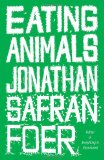Reading Guide Questions

Please be aware that this discussion guide will contain spoilers!
Discussion Guide & Resource Guide
Questions and topics for discussion
- Conversations about Eating Animals - and the reasons behind
the decisions we make - can be polarizing and often alienating.
In "All or Nothing or Something Else," Jonathan Safran Foer
writes, "We need a better way to talk about Eating Animals. We
need a way that brings meat to the center of public discussion
in the same way it is often at the center of our plates" (page 33).
What does Foer mean by this? Do you agree with him?
- Why do you think that something as essential as what we put in
our bodies is so often disregarded or not thought through carefully?
What is the potential convenience of such nonchalance
and what problems can it lead to?
- What are some of the challenges of being a vegan or a vegetarian?
Does where you live matter? To what extent do you
think economics play into the decision of eating responsibly or
of supporting local farms?
- We have so many food choices available to us now. Is this, in
your opinion, a blessing or a curse?
- We sometimes hear in the media about the inhumane treatment
of animals in factory farms and about the unhealthy - and
sometimes fatal - consequences that such treatment can have
for us. In your opinion, how do books such as Eating Animals, The Omnivore's Dilemma by Michael Pollan, and Animal,
Vegetable, Miracle by Barbara Kingsolver, or documentaries
like Food, Inc., differ from "breaking news" stories and exposés?
Why are both modes of information important and how
do they contribute to the conversation in different ways? Is one
more lasting than the other? If so, explain why.
- Were there any facts cited in Eating Animals that shocked you?
If so, what were they?
- At what point do you think awareness of factory farming will be
sufficiently raised in the public eye? Do you think that if people
have enough information they'll stop buying factory-farmed meat?
- Foer's relationship with eating is grounded in his memories
of meals shared with his grandmother and the stories she told
about food. Even when she was on the run from Nazis and
starving, she would not eat pork. "If nothing matters, there's
nothing to save," she tells Foer and his brothers (page 17). Foer
concludes Eating Animals with the same thought, after more
than twenty years of his own experiences informing his choices
about food. Discuss the significance of this sentiment and how
its implications can find universal resonance.
- How do you feel about making food choices for other people?
Discuss Foer's decision to raise his children as vegetarians
before they are old enough to understand the ethical reasons
behind such a lifestyle. Would you ever make a similar choice?
- Discuss the aspects of Eating Animals that you found to be controversial,
if any. Were they helpful in opening a dialogue on
the subject? Why or why not? Have any of your eating habits
changed since reading this book?
Resource guide
Now that you've read Eating Animals, you know that factory
farming - which accounts for virtually all meat sold in supermarkets
and prepared in restaurants - is almost certainly the single
worst thing that humans do to the environment and to animals.
Changing the way our food is produced begins with us, with the
choices we make every day. Here are eight things you can do to
make a difference:
- Spread the word. Talk about this issue with your friends, family,
and colleagues.
- Eat conscientiously - as few animals as possible, ideally none. More
than 99 percent of animal products are produced under factory
farm conditions ( www.farmforward.com /farming-forward/food
-choices).
- Support pending state and federal legislation to improve standards
for farms. Learn more about legislation aimed to improve
conditions for farm animals ( www.hsus.org /farm/camp/
legislation.html) and legislation that addresses the effects
of farms on our environment ( www.waterkeeper.org /ht/d/
Contents/cids/275,1383/pid/201) and communities ( www
.sustainabletable.org /issues/community/).
- Tell Congress that you want to support alternatives to factory
farming. Every year, agribusiness receives billions of dollars in
subsidies and grants that make factory farming possible ( http://
fdn.actionkit.com/cms/sign/Factory_Farm_Bailout/#1 ).
- Have a conversation with the people who produce your food. If
you aren't allowed to see where your food comes from, avoid eating
it ( www.eatwellguide.org /i.php?pd=Home).
- Stay informed about current issues in the fight for more humane
and sustainable farming. Sign up to receive newsletters from
groups such as Farm Forward ( www.farmforward.com ) and the
Humane Society of the United States ( www.hsus.org ).
- Support organizations working for change:
Farm Forward: www.farmforward.com
Farm Sanctuary: www.farmsanctuary.org
Food and Water Watch: www.foodandwaterwatch.org
Food Democracy Now!: www.fooddemocracynow.org
Humane Society of the United States: www.hsus.org
People for the Ethical Treatment of Animals: www.peta.org
Sierra Club: www.sierraclub.org
Sustainable Table: www.sustainabletable.org
Waterkeeper Alliance: www.waterkeeperalliance.org
- Buy products from the most progressive farmers in America.
Sustainable Table's "Eat Well Guide" ( www.eatwellguide.org /
i.php?pd=Home) provides an extensive list of small farmers.
Unless otherwise stated, this discussion guide is reprinted with the permission of Back Bay Books.
Any page references refer to a USA edition of the book, usually the trade paperback version, and may vary in other editions.






